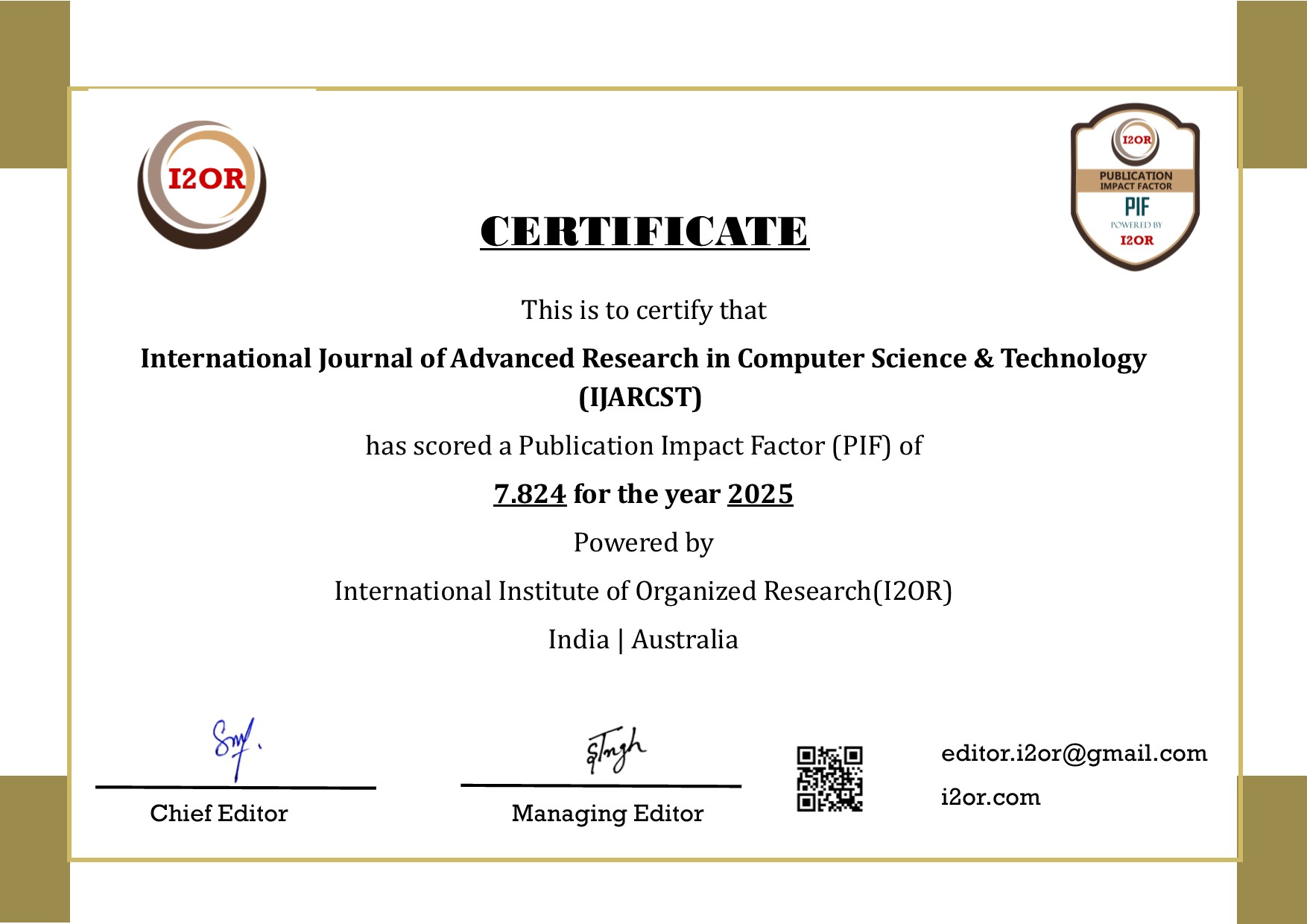The Role of Artificial Intelligence in Reducing Implicit Bias in Recruitment: A Systematic Review
DOI:
https://doi.org/10.15662/IJARCST.2024.0706008Keywords:
artificial intelligence, AI Gamification, implicit bias, recruitment, systematic review, algorithm fairnessAbstract
This systematic review critically examines the role of artificial intelligence (AI) in mitigating implicit bias within recruitment practices. Implicit bias, often manifesting through unconscious stereotypes, continues to undermine equity in candidate selection processes. As AI technologies are increasingly integrated into hiring systems, their potential to reduce human bias through standardized, data-driven methodologies warrants rigorous investigation. Drawing on empirical and theoretical literature published between 2010 and 2024, this review synthesizes findings from diverse sources to evaluate the effectiveness, limitations, and ethical implications of AI-based recruitment tools. The analysis identifies both promising advancements such as AI gamification, fairness-aware algorithms, and hybrid decision-making models and persistent challenges, including algorithmic opacity, data bias, and inadequate regulatory oversight. The findings suggest that AI can contribute to more equitable hiring outcomes when implemented with transparency, robust data governance, and interdisciplinary oversight. The review concludes by proposing directions for future research, emphasizing the need for longitudinal studies and the integration of ethical frameworks to ensure that AI systems not only improve efficiency but also uphold principles of fairness and inclusivity in organizational recruitment.
References
1. Abuladze, L., & Hasimi, A. (2023). The Montreal Declaration for Responsible AI: A framework for ethical AI development. [Publisher or journal details not provided; verify source for complete citation].
2. Ahmed, N. (2023). Industry-wide standards for ethical AI in recruitment: Challenges and opportunities. [Publisher or journal details not provided; verify source for complete citation].
3. Albaroudi, S., Al-Khatib, A., & El-Baz, H. (2024). Transforming recruitment: The impact of AI-powered tools on efficiency and fairness. [Publisher or journal details not provided; verify source for complete citation].
4. Awad, E., Dsouza, S., & Shariff, A. (2023). Debiasing AI recruitment systems: Techniques and outcomes. [Publisher or journal details not provided; verify source for complete citation].
5. Barocas, S., & Selbst, A. D. (2016). Big data's disparate impact. California Law Review, 104(3), 671–732. https://doi.org/10.15779/Z38BG31
6. Bertrand, M., & Mullainathan, S. (2003). Are Emily and Greg more employable than Lakisha and Jamal? A field experiment on labor market discrimination. American Economic Review, 94(4), 991–1013. https://doi.org/10.1257/0002828042002561
7. Bogen, M., & Rieke, A. (2018). Help wanted: An examination of hiring algorithms, equity, and bias. Upturn. https://www.upturn.org/reports/2018/hiring-algorithms/
8. Buolamwini, J., & Gebru, T. (2018). Gender shades: Intersectional accuracy disparities in commercial gender classification. Proceedings of the 1st Conference on Fairness, Accountability and Transparency, 81, 77–91. http://proceedings.mlr.press/v81/buolamwini18a.html
9. Cai, L., & Pan, J. (2023). Gamified recruitment assessments: Balancing engagement and equity. Journal of Applied Psychology, 128(5), 789–802. https://doi.org/10.1037/apl0000999
10. Costa, J., Silva, C., & Antunes, M. (2024). Mathematical modeling for user engagement in gamified recruitment platforms.
11. Cowgill, B., & Tucker, C. (2020). Algorithmic bias in hiring: Evidence and implications. Journal of Economic Perspectives, 34(4), 147–167. https://doi.org/10.1257/jep.34.4.147
12. Crenshaw, K. (1989). Demarginalizing the intersection of race and sex: A Black feminist critique of antidiscrimination doctrine, feminist theory and antiracist politics. University of Chicago Legal Forum, 1989(1), 139–167.
13. Czaja, S. J., Boot, W. R., Charness, N., & Rogers, W. A. (2019). Designing for older adults: Principles and creative human factors approaches (3rd ed.). CRC Press. https://doi.org/10.1201/9781315167194
14. Floridi, L. (2019). The ethics of artificial intelligence: Principles, challenges, and opportunities. Oxford University Press. https://doi.org/10.1093/oso/9780198835646.001.0001
15. Gaucher, D., Friesen, J., & Kay, A. C. (2011). Evidence that gendered wording in job advertisements exists and sustains gender inequality. Journal of Personality and Social Psychology, 101(1), 109–128. https://doi.org/10.1037/a0022530
16. Goodman, B., & Flaxman, S. (2017). European Union regulations on algorithmic decision-making and a "right to explanation". AI Magazine, 38(3), 50–57. https://doi.org/10.1609/aimag.v38i3.2741
17. Greenwald, A. G., Poehlman, T. A., Uhlmann, E. L., & Banaji, M. R. (2009). Understanding and using the Implicit Association Test: III. Meta-analysis of predictive validity. Journal of Personality and Social Psychology, 97(1), 17–41. https://doi.org/10.1037/a0015575
18. Hackerearth. (2024). Gamified recruitment: Reducing time-to-hire and boosting candidate satisfaction.
19. Hamari, J., Koivisto, J., & Sarsa, H. (2014). Does gamification work? A literature review of empirical studies on gamification. Proceedings of the 47th Hawaii International Conference on System Sciences, 3025–3034. https://doi.org/10.1109/HICSS.2014.377
20. Hofeditz, L., Müller, S., & Mirbabaie, M. (2022). Explainable AI in recruitment: Enhancing transparency and reducing bias.
21. Mirbabaie, M., Brünker, F., & Hofeditz, L. (2023). Interpreting explainable AI outputs in HR: Challenges and opportunities.
22. Pymetrics Inc. (2022). Neuroscience-based games for recruitment: Measuring cognitive and emotional traits.
23. Raghavan, M., Barocas, S., Kleinberg, J., & Levy, K. (2020). Mitigating bias in algorithmic hiring: Evaluating claims and practices. Proceedings of the 2020 Conference on Fairness, Accountability, and Transparency, 469–481. https://doi.org/10.1145/3351095.3372828
24. Sánchez-Monedero, J., Dencik, L., & Edwards, L. (2020). What does it mean to 'solve' the problem of discrimination in hiring? Social, technical and legal perspectives from the UK on automated hiring systems. Proceedings of the 2020 Conference on Fairness, Accountability, and Transparency, 458–468. https://doi.org/10.1145/3351095.3372849
25. Trifilo, M., & Blau, G. (2024). Racially ambiguous avatars in virtual interviews: Reducing race-related bias.
26. Vincent, J. (2018, October 10). Amazon scraps secret AI recruiting tool that showed bias against women. The Verge. https://www.theverge.com/2018/10/10/17958784/amazon-ai-recruitment-bias-women-sexist
27. Wilson, H. J., Daugherty, P. R., & Morini-Bianzino, N. (2017). The jobs that artificial intelligence will create. MIT Sloan Management Review, 58(4), 14–16.
28. Zhang, B., Yu, L., & Chen, P. (2021). AI in recruitment: Bridging the gap between fairness and efficiency. Journal of Artificial Intelligence Research, 70, 889–920.





